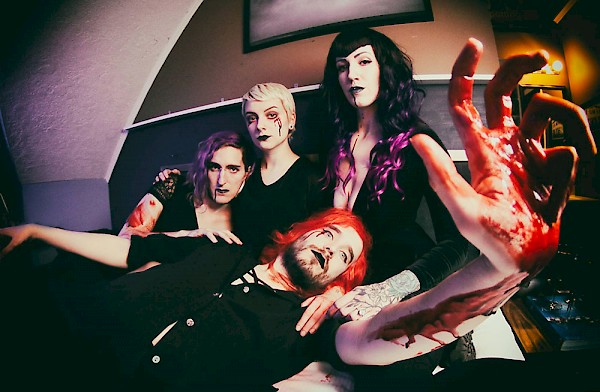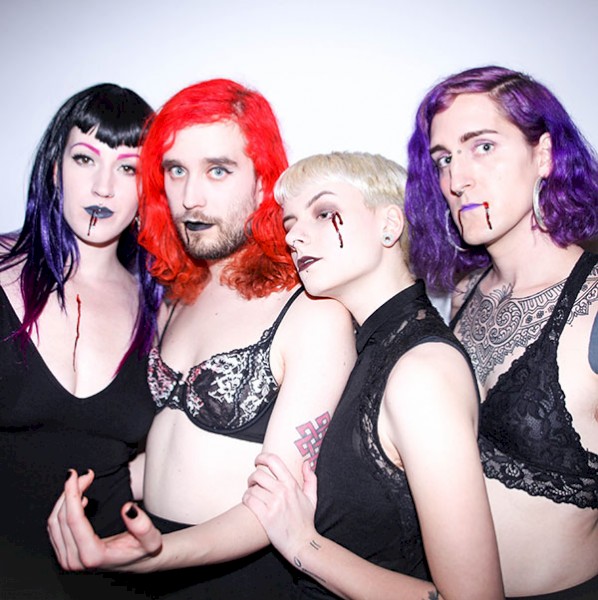 Photo by Dani RansomSweeping Exits are a Portland band consisting entirely of trans members, and they have chosen horror as a vehicle for their expression. In advance of their album release show on Friday, June 9, I spoke with lead vocalist Mira Glitterhound about why this mode empowers her and how it has shaped the sound of the forthcoming Glitter & Blood.
Photo by Dani RansomSweeping Exits are a Portland band consisting entirely of trans members, and they have chosen horror as a vehicle for their expression. In advance of their album release show on Friday, June 9, I spoke with lead vocalist Mira Glitterhound about why this mode empowers her and how it has shaped the sound of the forthcoming Glitter & Blood.
Why is it important for Sweeping Exits, as a band of queer people, to incorporate horror into your aesthetic as a group as well as your music?
Horror is the perfect vehicle for queer expression to me, because it has always been about fear of the other. Traditional horror shows society being attacked by a feared other, and then banding together to thwart the “monster.” What we do is the inverse: The outcasted other is the protagonist, standing up to a spiteful and ignorant society.
Tell me about the concept of Glitter & Blood and how you came up with it.
Glitter & Blood tells the story of Desmond, a queer boy who is rescued from his boring human life by Lady Death, the Queen of the Vampires. He is brought up in her palace, and then sent back into the human world as a rockstar to help lure humans in for the vampires' feasting rituals. I won’t give away the ending.
The storyline evolved organically, each plot point emerging out of a song (rather than the other way around). Once I had the bulk of the plot, I did a lot of background/context work. I drew the characters, along with storyboards, maps and cities. I wrote stories and vignettes that wove in and out of the album’s plot. Adding visual and literary elements to the process helped me feel more deeply immersed in the world. Structuring the album came pretty naturally, though I did make a lot of spreadsheets and outlines. I ultimately decided I wanted the story to take place in four “movements,” modeled after a classical symphony. Each movement is four songs and makes up a specific chapter of Desmond’s life.
 Photo by Dani RansomThe album gives off Rocky Horror-esque, '70s rock vibes. Was the film an inspiration?
Photo by Dani RansomThe album gives off Rocky Horror-esque, '70s rock vibes. Was the film an inspiration?
The film has always been an important part of my life, and unsurprisingly, it was somewhat of a queer root for me. With Glitter & Blood, I wanted to capture the feeling of euphoric fantasy I get from the film and its soundtrack. I never quite fit in with "punk" as a kid, but Rocky Horror was something I fully understood. It felt like me. The music of Rocky Horror guided Glitter & Blood a lot, especially the use of passing tones and cabaret-style chord progressions. I was also inspired by the variety in song form, how it contains traditional verse chorus songs as well as more linear “storytelling” songs.
Do you have any advice for fellow queer musicians who are looking to break out into the scene?
My advice would be to focus on building your community and helping your friends. If all we have is individual queer bands breaking into the mainstream, they’re just going to be tokenized. My hope is that we can create a massive force of queer music, so it’s more of an all-out takeover than just a band or two getting talked about.




